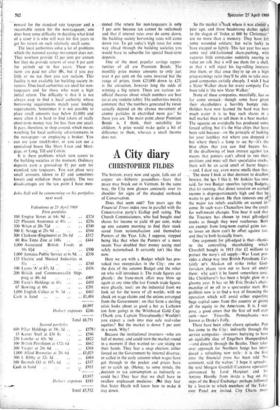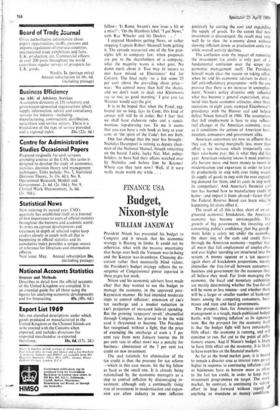A City diary
CHRISTOPHER FILDES
The bottom, every now and again, falls out of copper on—hitherto groundless—fears that peace may break out in Vietnam. In the same way, the City now glances anxiously over its shoulder for signs of the dreaded outbreak of Conservatism.
Does that seem odd? Ten years ago the Financial Times index rose in parallel with the Conservative party's Gallup poll rating. The Church Commissioners, who had bought steel shares for income to yield 10 per cent, woke up one autumn morning to find their stock saved from nationalisation and themselves Punters of the Year. Life, I suppose, stopped being like that when the Punters of a more recent Year doubled their money seeing steel safely nationalised. It certainly isn't like that now.
Here we are with a Budget which has pro- voked two sweepstakes in the City: one on the date of the autumn Budget and the other on who will introduce it. The trade figures are ghastly: the franc-mark affair may blow up again at any time (the last French trade figures were ghastly, too): on the industrial front we look set for the worst of all worlds, with no check on wage claims and the unions estranged from the Government : on that form a sterling crisis looks about as good a bet as Larbawn (on firm going) in the Whitbread Gold Cup. (Thank you, Captain Threadneedle.) Wouldn't you expect a rush into nice safe real-value equities? But the market is down 5 per cent in a week. Why?
Because the institutional investors—who are full of money, and could turn the market round in a moment if they wanted to—are sitting on their hands. They fear a snap election; either forced on the Government by internal disarray, or called in the early autumn when wages have got through to the pocket and prices have yet to catch up. (Hence, to some minds, the .decision to tax consumption as indirectly as could be.) They fear that we shall have to swallow unpleasant medicine: lid they fear that Sister Heath will know how to make it stay down.
So the market is.back where it was almialt a year ago, and those headstrong dashes uphill
to the slogan of 'Index at 600 by ChristmaSP are no more than a memory. They have _left some wounded soldiers; - but we're lucky to have escaped so lightly. This last year has seen some real old-fashioned share-pushing, with vacuous little companies suddenly soaring in value on talk that x will use -them for a shell,
or that Y will inject his log-rolling interests into them, or that once they're Up on a high price-earnings ratio they'll be able to take over good companies awfully cheaply. I wish I had a Slater Walker share for every company I've been told is 'the new Slater Walker.'
None of these companies, mercifully, has so far come unstuck—though some have given their shareholders a horribly bumpy ride. Holders have now learned the hard way how much easier it is to buy such shares in a bull market that). to sell them in a bear market. The squeeze on overdrafts has produced some forced selling, but it's the blue chips that have been sold because—on the principle of looking for your latchkey not where you dropped it but where there's a lamp to see by—it's the blue chips that you can find buyers for. If the disallowing of loan interest against tax means that punters can't afford to run their positions and must sell their speculative stock, there will be an acrid smell of burnt finger, —and. I dare say, even worse smells than that. -' - The more I look at that decision to disallory Interest, the less I like it. Mr Jenkins has now said, for two Budget speeches (spring Budget,. that is) running, that direct taxation on earned income is disproportionately high and that he wants to get it down. He then removes one of the major tax reliefs available on earned in- come. In such ways Chancellors lose the credit for well-meant changes. You hear it said that the Treasury has chosen to treat gilt-edged stocks as though they were racehorses. Both are exempt from long-term capital gains tax: so losses on them can't be offset against tax; and they're both basically losers.
One argument for gilt-edged is that—thanks to the controlling shareholding which Churchill bought in 1913 (for £2 million) to protect the navy's oil supply—War Loan pro- vides a cheap way into British Petroleum. Cer- ,
tainly BP's Alaskan oil strike (what God-
forsaken, places turn out to have oil under them: why can't it be found somewhere cosy. like Chislehurst?) has been a bright glow in a gloomy year. It has set Mr Eric Drake's chair- manship of Be off to a spectacular start. His problem now is to find a way of financing the operation which will avoid either exporting huge capital sums from this country or giving all the equity to the Americans. It is, I sup- pose, a good omen that the first oil well ever sunk—near Titusville, Pennsylvania—was known as Drake's Folly.
There have been other cheery episodes. Pop has come to the City: indirectly through the service companies—investors hurrying to have an equitable slice of Engelbert Humperdinck —and directly through the Beatles. Their take- over approach for Northern Songs has intro- duced a refreshing new style: it is the first time the financial press has been told 'No comment, said the walrus.' I hope it spreads: the next Morgan Grenfell/Cazenove operation announced by Lord Harcourt and Sir Antony Hornby from inside a bag on the steps of the Royal Exchange: perhaps followed by a love-in to which members of the Take- over Panel are invited. City Charts must follow : 'Is Rowe, Swann's new issue a hit or a miss?' : 'On the Hambros label, "I got News," with Ray Wheeler and his Dealers . .
I enjoyed Hambros getting News, or rather stopping Captain Robert Maxwell from getting it. The episode reasserted one of the few prin- ciples left to company law; when proposals are put to the shareholders of a company, what the majority wants is what goes. No damn merit about it. You may (it occurs to me) have missed AB Electronics' bid for Colvern. The final reply--to a bid some 25 per cent above the prevailing share price— was : 'We control more than half the shares. and we don't want to deal, and Kleinworts say so too, so good morning.' I give you (as Wooster would say) the gist.
It is to be hoped that when the Panel, egg- bound for so long, lays its Code, this kind of answer will still be in order. But I fear that we shall have elaborate rules and a sancti- monious top-dressing too. TO me it seems that you can have a rule book as long as your arm; or 'the spirit of the Code'; but not both.
One last change that the year has brought : Nicholas Davenport is retiring as deputy chair- man of the National Mutual, tinnier remaining on the board. Lucky, lucky Nat. Mut. policy- holders, to have had their affairs watched over by Nicholas and before him by Keynes! Where can they turn now? Well, if it were really made worth my while . . .











































 Previous page
Previous page